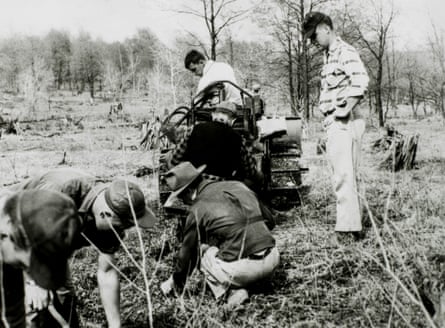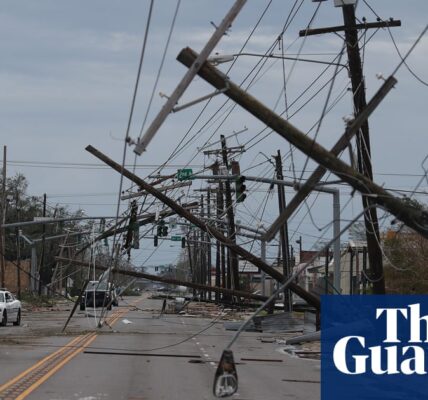New study reveals that trees in the eastern US are effectively mitigating the effects of global warming.
Trees provide innumerable benefits to the world, from food to shelter to oxygen, but researchers have now found their dramatic rebound in the eastern US has delivered a further, stunning feat – the curtailing of the soaring temperatures caused by the climate crisis.
Although the US, along with the rest of the globe, has experienced an increase in temperature since the industrial era, researchers have been perplexed by a phenomenon known as the “warming hole” in certain regions of the south-east where temperatures have remained steady or even decreased, despite the overall warming trend.
A primary cause of this discrepancy, according to a recent study, is the extensive replanting of many parts of the eastern United States after the initial depletion of trees due to European colonization. Over the last century, these areas have been replanted on a large scale – with enough new trees to cover an area bigger than England – which has slowed down the impact of global warming.
Mallory Barnes, a scientist at Indiana University, stated that the reforestation efforts have had a significant impact on the air temperature in the surrounding area. The phenomenon known as the “warming hole” has long been a mystery, and while this research does not provide a complete explanation, it does demonstrate the crucial connection between the return of trees and its presence.
In the early days of US settlement, there was a significant increase in deforestation as trees were cleared for farming and housing. However, this trend started to reverse in the 1920s as more people moved to urban areas, allowing previously abandoned land to be repopulated with trees. In addition, the US government implemented a vigorous tree-planting initiative, resulting in approximately 15 million hectares of reforested land in the eastern US over the last century.

The regrowth of forests in the eastern United States has lessened the effects of global warming primarily through the process of transpiration. This involves water being absorbed by the tree roots and then released into the air as vapor from the leaves, resulting in a slight cooling effect on the surrounding environment.
By analyzing information gathered from satellites and weather stations in the eastern US between 1900 and 2000, Barnes and her team discovered that reforested regions have had a significant cooling effect, especially within 400 meters of the trees.
Overall, the reforested areas currently decrease temperatures in the eastern US by 1C to 2C (1.8F to 3.6F) annually. This cooling impact is most significant during the hottest summer days, with trees lowering temperatures by 2C to 5C (3.6F to 9F), according to the study.
The scientists warned that the return of trees cannot be solely attributed to the halt in global warming. Other factors, such as air pollution and agricultural irrigation, also contribute to this phenomenon by blocking incoming sunlight. However, Barnes suggests that these results should strengthen the push for careful reforestation, especially in urban areas where the absence of trees leads to excessively hot temperatures.
According to Barnes, trees have a positive effect on surface temperatures by releasing water vapor, similar to how humans sweat, resulting in significant cooling.
“Skip the advertisement for the newsletter”
after newsletter promotion

In the future, we must consider tree planting as more than just a means to absorb carbon dioxide. It can also provide cooling benefits and aid in adapting to climate change, making cities more resilient against excessive heat.
According to Patrick Gonzalez, a climate change scientist and forest ecologist at the University of California, Berkeley, who was not involved in the new study, the research offers significant evidence for the theory of trees cooling.
He stated that reducing carbon emissions from vehicles, power plants, and other human activities that use coal, oil, and methane is crucial in stopping climate change. Additionally, he mentioned that allowing trees to regrow naturally and planting new ones in suitable areas can also make a significant impact.
Barnes also emphasized that planting new trees cannot replace the urgent action needed to significantly reduce greenhouse gas emissions, which reached a record high globally last year.
She stated that relying solely on nature-based solutions such as tree planting will not solve the problem of climate change. It is a misconception to believe that planting a few trees will suffice; significant reductions in fossil fuel emissions are necessary to reach our goals. Reforestation should be seen as a complement to emission reductions, not a replacement for them.
Source: theguardian.com



